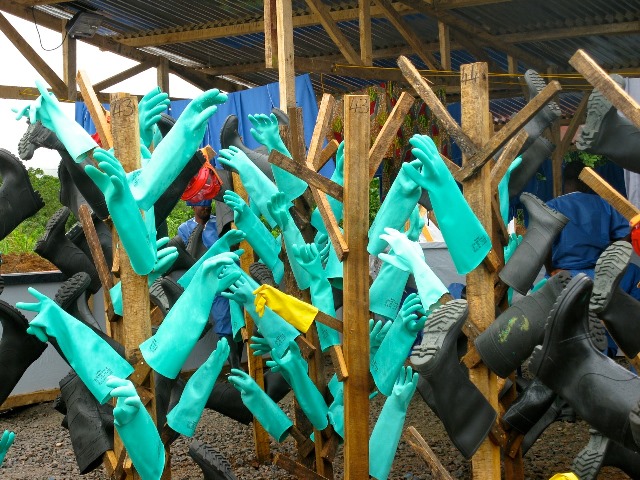Canadian Red Cross recruiting delegates to respond to the Ebola outbreak in West Africa
The current Ebola outbreak in West Africa is the largest in history and has resulted in more than 4,900 deaths to date. As the rest of the world worries about Ebola coming to their countries, officials have repeatedly warned that to keep Ebola from spreading across the globe, we must stop the outbreak in West Africa. To do that, financial and human resources are desperately needed.
MORE: EBOLA: IS CANADA PREPARED?
When the call came asking Dr. Lauralee Morris to deploy to West Africa, she was apprehensive but knew in her heart that she wanted to do her part in the fight against Ebola. Dr. Morris, a physician with the Canadian Red Cross Emergency Response Unit (ERU), had a strong interest in public health and infectious diseases.
Dr. Morris had previously deployed with the Red Cross four times, including to Camp Azraq in Jordan and to the Philippines following Typhoon Haiyan in 2013. She had also deployed several times with other humanitarian aid organizations. Previous experience taught her that every response is unique, and her experience deploying to the Ebola response in West Africa was no different.
MORE: HOW ONE HOSPITAL MADE HAND HYGIENE RATES SOAR
“This was my first experience with Ebola patients, and I have to admit I was nervous,” says Dr. Morris. She underwent extensive hands-on training prior to her deployment and had lots of practice with the personal protective equipment (PPE). “There is some risk involved for the team caring for Ebola patients, but the risk was very well controlled. I had excellent training, high quality equipment and I felt safe while I was there.”
Dr. Morris spent a month at the Red Cross Ebola treatment centre in Kenema, Sierra Leone. Along with a team of nurses, social workers, hygiene workers, other physician and volunteers from Sierra Leone, Dr. Morris spent her days overseeing the clinical case management of patients. Over time, she realized that while she initially deployed because of her professional interests, her motivation changed. “As the days passed, I became more comfortable with managing risks and truly started to see how important our work was. This is a humanitarian emergency and we all need to do what we can.”
The timing of her deployment resulted in Dr. Morris arriving in Kenema in time to see the first patients be admitted to the Red Cross Ebola treatment centre. “Seeing those same patients get discharged was an incredibly rewarding feeling. It is possible – we can make a difference,” says Dr. Morris.
MORE: INFECTION CONTROL: HOW TO EDUCATE AND MOTIVATE
Reflecting back on her time in Sierra Leone, Dr. Morris feels this was one of her most rewarding missions to date. “My time in Sierra Leone was absolutely worth it. The disparity in health care between Canada and West Africa is shocking and there is a tremendous need for health care workers. As the epidemic continues to grow, it is becoming more of a danger to the rest of the world. I feel proud that I was able to play a part in stemming the tide of the biggest public health emergency of our time.”
One of the greatest challenges of the Ebola outbreak has been learning to live in a world without human touch. In an effort to stop the spread, handshakes and hugs have been replaced by gestures of placing hands over the heart. So it is ironic that in this new world without touch, helping hands are what is most needed.
For more information on becoming a Red Cross delegate and how you can participate in the fight against Ebola, please visit www.redcross.ca/careers or email internationalhr@redcross.ca. To support the efforts of the Canadian Red Cross in stopping the spread of Ebola can donate to the West Africa Ebola Fund at www.redcross.ca or by calling 1-800-418-1111.


